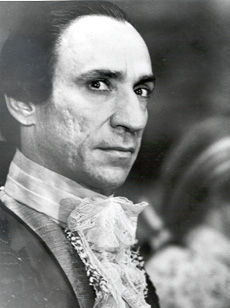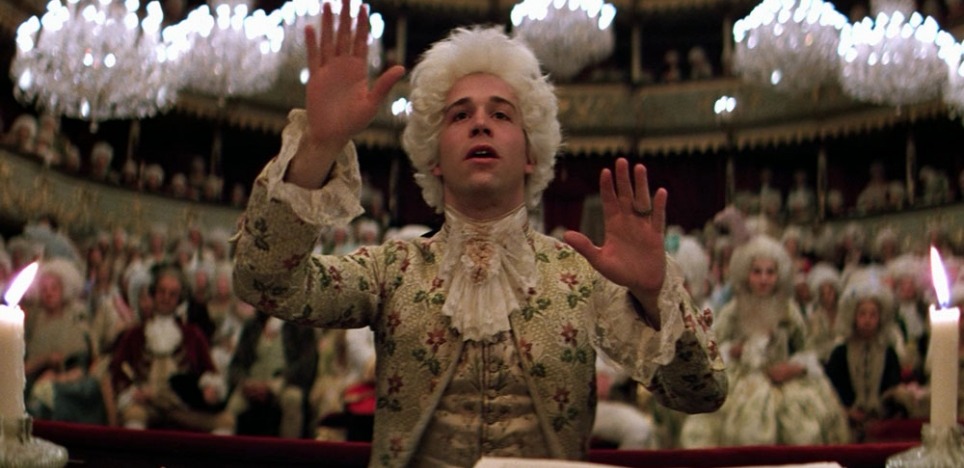When we are caught up in envy, we are prisoners of someone else. One of the best films ever made about this destructive emotion is Amadeus, an Academy Award winning 1984 drama revolving around the life and works of the great composer Wolfgang Amadeus Mozart (1756-1791). Antonio Salieri, an Austrian composer, becomes obsessed with this genius's effortless creativity and fame. Although he himself is a skilled musician, envy makes it impossible for him to enjoy what he has.
In many spiritual traditions, it is considered a great gift of God to be able to gracefully celebrate the happiness and success of others. But this is only possible when we practice gratitude — giving thanks for all the bounties that we have received and that others have received as well.
The questions and exercises in this discussion guide point to some of these themes along with a consideration of genius, music, success, the triumphs of others, and self-esteem
Amadeus runs 158 minutes and is rated PG. For our review of the film and a plot synopsis, click here.

1. GENIUS
Oliver Wendell Holmes once observed: "The world is always ready to receive talent with open arms; very often it does not know what to do with genius."
- What are your first impressions of Mozart as a child genius? How do those views change when you see him at the age of 26?
- Have you ever known any geniuses? What were they like? Are you more tolerant of character defects in people with great God-given gifts than you are of so-called normal people?
2. MUSIC
"There is no feeling — human or cosmic — no depth, no height the human spirit can reach that is not contained in Mozart's music," Lili Kraus wrote in 1926.
- Mozart’s music was revered by such renowned composers as Hayden, Chopin, and Rossini? What do you think makes his music so appealing?
- Share your reactions to Mozart's own comment on his music: "Music must never offend the ear; it must please the hearer; in other words, it must never cease to be music."
- Which of the Mozart selections in Amadeus is most memorable to you? Why?
- Discuss the following quotation by theologian Karl Barth, quoted in his obituary in the New York Times, December 11, 1968: "Whether the angels play only Bach praising God, I am not quite sure; I am sure, however, that en famille, they play only Mozart."
3. SUCCESS
Journalist Phyllis Rose has written: "Success tends to engender depression. What you've got doesn't seem as good as you thought it would be. All that energy for this?"
- According to many cultural commentators, the notions of success and failure arose in the West in the aftermath of the Renaissance and the waning of the authority of structured religion. Despite the fact that Salieri is successful in his time, he is obsessed with the realization of his own mediocrity. Why can't he just accept his place in history and be grateful for his talents?
- Some cultural critics have labeled success America's national disease. Do you agree? Why or why not? How seriously do you measure your worth by your successes or failures? What is the spiritual alternative to this lose-lose means of evaluation?

4. ENVY
"Here's the truth: you can't be someone else. You can only be you. When I catch myself up in envy, it's as if I were ensnared in a sticky spider web: I can't move toward what I can be, what I can have. I can just gaze longingly at someone else's life and long for it. So Demon Envy wins big: I increase the sum of the world's anger, I increase the sum of the world's dishonesty by not admitting it, and I don't grow in my own joy," Barbara Cawthorne Crafton writes in Meditations on the Book of Psalms.
- In what ways does envy twist and poison Salieri’s life? In what sense is he a vampire feeding off of Mozart's genius?
- When have you found yourself ensnared in the sticky spider web of envy? How did it affect your life? What did you learn from the experience?
5. THE TRIUMPH OF OTHERS
In The Kabbalah of Envy, Rabbi Nilton Bonder writes: "For humans, happiness is a more sophisticated emotion than sadness. Tears are more accessible than a guffaw. Strange as it may seem at first, it is easier to empathize with the suffering and failures of others than the offer of solidarity in times of success and happiness. At this frontier we catch a glimpse of our real selves."
- What scenes in the drama best convey Salieri's inability to join with others in celebrating Mozart’s virtuosity?
- Share your responses to Bonder's contention that envy is rooted in our inability to share in the success and happiness of others. What holds you back from joining in with accolades when someone else hits the jackpot?

6. SELF-ESTEEM
Nathaniel Branden has observed: "There is overwhelming evidence that the higher the level of self-esteem, the more likely one will treat others with respect, kindness, and generosity."
- How would you characterize Salieri's level of self-esteem? In what ways has his lack of compassion for himself contributed to his external tension and inner turmoil?
- Talk a little about the connections you have witnessed between self-esteem and individuals with large reserves of kindness and generosity.
7. GRATITUDE
"It is important not only to be grateful to others but also to be grateful for others. We need to cultivate a gratitude for others' giftedness in the same way that we appreciate a beautiful sunset or a smile from a loved one. Others always seem to have been given gifts in life that we desire, and so it's easy to be envious. Riding sidesaddle with envy is a dangerous practice: I would be happy if I had what he or she possesses. By contrast, giving thanks constantly and in all circumstances liberates us from envy," Edward Hays writes in The Great Escape Manual.
- What is the end result of Salieri's envy of Mozart?
- The next time you find yourself riding sidesaddle with envy over what another person has, try the spiritual practice of giving thanks at all times for what you have.
This guide is one in a series of more than 200 Values & Visions Guides written by Frederic and Mary Ann Brussat. Text copyright 2001 by Frederic and Mary Ann Brussat. Photos courtesy of the Saul Zaentz Company. This guide is posted as a service to visitors to www.SpiritualityandPractice.com. It may not be photocopied, reprinted, or distributed electronically without permission from Frederic and Mary Ann Brussat — except it may be duplicated for use by groups participating in the e-course "Going to the Movies as a Spiritual Practice." For other uses and for a list of guides in the Values & Visions series and ordering information, email your name and mailing address to: brussat@spiritualrx.com.
